|
 Secure Site
Secure Site
|
 |
Archive for the 'Natural Awakening' Category
 Ohara Koson (1877~1945) Herons. Meiji period Now & Zen’s favorite architectural element in the castles of Japan (like, Matsumoto Castle, one of Japan’s finest historic castles) is the “moon-viewing” room.
This tradition is descripted below:
Tsukimi or Otsukimi, literally moon-viewing, refers to Japanese festivals honoring the autumn moon.
Tsukimi refers to the Japanese tradition of holding parties to view the harvest moon. The custom is thought to have originated with Japanese aristocrats during the Heian period, who would gather to recite poetry under the full moon of the eighth month of the lunisolar calendar, known as the “Mid-Autumn Moon.”
One of the ultimate Zen like experiences is waking-up from a great slumber refreshed and energized. Your mind and body are harmoniously one, both alert and focused. Having a refreshed mind and body are two keys to a natural and Zen lifestyle. Waking up in the morning should not be a loud and abrupt awakening, but rather it should be a peaceful positive experience. The right natural alarm clock can transition your deep and tranquil sleep into a serene start to consciousness. Imagine a long-resonating Tibetan bell-like chime waking you up to a beautiful morning experience.
The right alarm clock can be the most beneficial investment for you. With our Now & Zen natural alarm clock you are awakened more gradually and thus more naturally. Now & Zen is focused on creating a naturalistic lifestyle, and our clocks are an example of our philosophy.
Now & Zen’s – Meditation Timer and Alarm Clock Store
1638 Pearl Street
Boulder, CO 80302
(800) 779-6383
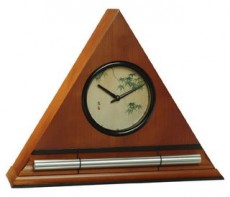 Japanese Leaves Zen Alarm Clock
Posted in Japanese Inspired Zen Clocks, Natural Awakening, Now & Zen Alarm Clocks, Progressive Awakening
 Staying Healthy - woodblock print by Toyohara Chikanobu (1838-1912), dated 1896; In the midst of the cold winter months, a burst of sunshine is a welcome sight. When most days are gray, it’s hard to remember that the sun is still there in the sky—it hardly pierces through the gray curtain of clouds that seems to seal in cold air. The apparent absence of sunlight can drive even the most chipper of people into a mental funk.
One reason why the winter months can be so hard is due to the inability of the body to attain and process vitamin D, which is responsible for keeping autoimmune diseases, seasonal affective disorder, poor bone health, and arthritis at bay. The sun is the body’s single most reliable source of vitamin D, and between the months of November and April, there are no ultra-violet B rays available north of Atlanta, Georgia. This causes vitamin D levels to drop drastically.
Vitamin D boosts the immune system, thus explaining why the common cold and influenza make a widespread appearance this time of year. Sunlight is also known to decrease stress and anxiety, not necessarily because of its affect on vitamin D levels, but because of its general mood-boosting properties; serotonin production increases in sunlight.
So how do you make sure you get enough sunlight in winter? Get outside for at least 30 minutes a day even if you’re bundled up like an Arctic explorer. If 30 minutes isn’t an option due to a packed schedule, a light therapy lamp with 10,000 lux simulates daylight and tricks your mind into reaping the mental benefits of sunlight. If you’re feeling fine in your mind but can’t get rid of a cold, Vitamin D can be found in cod liver, fish oil, herring, oysters, salmon, halibut, soymilk, shrimp, milk, fortified cereals, mushrooms, and eggs. Northerners will want to explore a vitamin D supplement.
In the dead of winter, it may be hard to imagine the warm, summery days that will eventually return, but they will. In the meantime, load up on vitamin D, bundle up, and keep moving!
adapted from Natural Solutions Magazine, February 2012
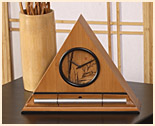 Zen Alarm Clocks and Timers for Yoga and Meditation Now & Zen – The Zen Alarm Clock Store
1638 Pearl St.
Boulder, CO 80302
(800) 779-6383
Posted in Meditation Timers, mindfulness practice, Natural Awakening, nature
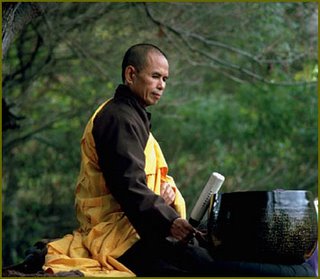 Compassionate Listening Practice by Thich Nhat Hanh When we speak of listening with compassion, we usually think of listening to someone else. But we must also listen to the wounded child inside of us. The wounded child in us is here in the present moment. And we can heal him or her right now.
Practice:
“My dear little wounded child, I’m here for you, ready to listen to you. Please tell me all your suffering, all your pain. I am here, really listening.” If you know how to go back to her, to him, and listen like that every day for five or 10 minutes, healing will take place. … Do that for a few weeks or a few months, the wounded child in you will be healed. Mindfulness is the energy that can help us do this. —Thich Nhat Hanh, from Anger: Wisdom to Cool the Flames
Our Zen Timepiece’s acoustic 6-inch brass bowl-gong clock is the world’s ultimate alarm clock, practice timer, and “mindfulness bell.”
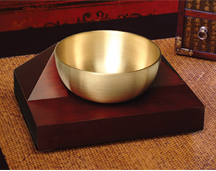 Singing Bowl Mindfulness Gong and Timer adapted from Natural Solutions Magazine, January 2008
 Zen Timepiece with brass bowl, a perfect meditation timer with gentle gong Now & Zen’s Clocks and
Timers
1638 Pearl Street
Boulder, CO 80302
(800) 779-6383
Posted in intention, Meditation Timers, Meditation Tools, mindfulness practice, Natural Awakening, prayer, Well-being, zen, zen monks, Zen Timers
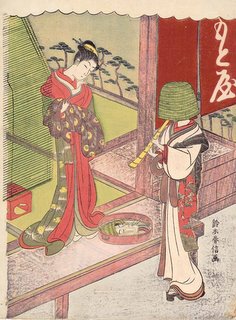 Courtesan of Montoya with Zen Monk by Suzuki Harunobo, ca. 1770 People in need of a creative boost should take a long nap, according to new research highlighted by ScienCentral. The researchers found that naps increase people’s ability to solve problems creatively, but only if the nap includes REM, the deep sleep when dreams occur. REM sleep happens only after about an hour of sleeping, so a long nap is recommended. According to researcher Sara Mednick, “If you take a nap with REM sleep, you’re actually going to be boosting your ability to make these new associations in creative ways.” Mednick has tried to put her findings to good use by taking a nap at least three times each week. It is helpful to use the Zen Alarm Clock for a gentle awakening from a nap.
What makes this gentle awakening experience so exquisite is the sound of the natural acoustic chime, which has been tuned to produce the same tones as the tuning forks used by musical therapists. According to the product’s inventor, Steve McIntosh, “once you experience this way of being gradually awakened with beautiful acoustic tones, no other alarm clock will ever do.”
adapted from Utne.com,September 2009 by Bennett Gordon
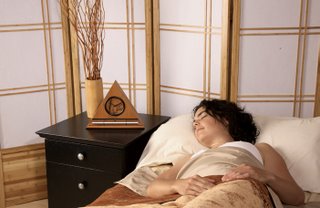 Zen Alarm Clocks for a gradual and progressive awakening to a nap, to boost creativity Now & Zen’s Alarm Clock Store
1638 Pearl Street
Boulder, CO 80302
Posted in Chime Alarm Clocks, Japanese Inspired Zen Clocks, Natural Awakening, Now & Zen Alarm Clocks, Progressive Awakening, Sleep Habits, Well-being
 Procrastinator Sleep Type: The Procrastinator
You get tired early in the evening, but by the time you go to bed, you’re wide awake.
What’s Going On?
Our bodies have two different mechanisms, one for sleep and one for wakefulness. Paul Glovinsky, Ph.D., coauthor of “The Insomnia Answer,” calls them the sleep drive and the alerting force, respectively. The problem is, these two forces can often be at odds with each other.
“The sleep drive depends on the fact that we’ve been up for a certain amount of hours, building the need for sleep,” he says. The longer we’re awake, the more intense it gets. But napping early in the evening or zoning out while watching TV can partially satisfy that sleep drive — so come bedtime, the alerting force has the upper hand, making it hard to nod off. For many people, adds Rubin Naiman, Ph.D., director of Sleep Programs at Miraval Resort, there’s “an ideal window of opportunity for falling asleep.”
What to Do
For starters, be aware of your sleep drive. If you feel yourself starting to doze off in the early evening — at dinner, for instance, or while reading or watching TV — get up and walk around. “It doesn’t take a lot. You don’t have to get up and run a mile,” explains Charles Atwood, Jr., M.D., associate director of the Sleep Medicine Center at the University of Pittsburgh Medical Center. “Just walk around your house a little bit. Usually that’s enough to keep you alert for another hour or so.”
However, if you feel yourself getting tired later in the night (say after 9 p.m. or so), don’t force your body to burn the midnight oil unless you really have to. As Bala Manyam, M.D., a neurologist and Ayurvedic expert, puts it, “Mother Nature is telling you, ‘You silly human being. You’re tired. Go to sleep now.'”
Waking up in the morning should be as pleasant as falling asleep at night. The Zen Alarm Clock’s gradual, gentle awakening is transformative.
“The Zen Alarm Clock,” uses soothing acoustic chimes that awaken users gently and gradually, making waking up a real pleasure. Rather than an artificial recorded sound played through a speaker, the Zen Clock features an alloy chime bar similar to a wind chime. When the clock’s alarm is triggered, its chime produces a long-resonating, beautiful acoustic tone reminiscent of a temple gong. Then, as the ring tone gradually fades away, the clock remains silent until it automatically strikes again three minutes later. The frequency of the chime strikes gradually increase over ten-minutes, eventually striking every five seconds, so they are guaranteed to wake up even the heaviest sleeper.
Adapted from Body + Soul Magazine, May 2008 by Sarah Schmelling
Boulder, Colorado—an innovative company has taken one of life’s most unpleasant experiences (being startled awake by your alarm clock early Monday morning), and transformed it into something to actually look forward to. “The Zen Alarm Clock,” uses soothing acoustic chimes that awaken users gently and gradually, making waking up a real pleasure. Rather than an artificial recorded sound played through a speaker, the Zen Clock features an alloy chime bar similar to a wind chime. When the clock’s alarm is triggered, its chime produces a long-resonating, beautiful acoustic tone reminiscent of a temple gong. Then, as the ring tone gradually fades away, the clock remains silent until it automatically strikes again three minutes later. The frequency of the chime strikes gradually increase over ten-minutes, eventually striking every five seconds, so they are guaranteed to wake up even the heaviest sleeper. This gentle, ten-minute “progressive awakening” leaves users feeling less groggy, and even helps with dream recall.
 Natural Awaking Clock with Chime Sounds Now & Zen’s Alarm Clock and Meditation Timer Store
1638 Pearl Street
Boulder, CO 80302
(800) 779-6383
Posted in Bamboo Chime Clocks, Chime Alarm Clocks, Natural Awakening, Now & Zen Alarm Clocks, sleep, Sleep Habits
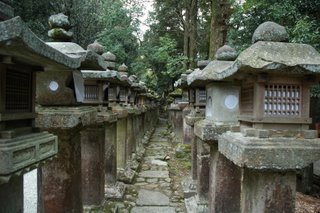 Stillness
In the larger scheme of things, our days on this planet are few and precious, so it seems fitting that we should begin each day with grace and beauty. Used as an alarm clock, your Zen Timepiece thus serves as a useful reminder that each day is a new and sacred opportunity to live life to its fullest.
 Zen Timepiece in Maple But in addition to its use as an alarm clock, your Zen Timepiece is also an aesthetically-sophisticated timer that enhances practice activities and social gatherings. It can also serve as a “mindfulness bell” that periodically calls you to stillness.
Founded in Boulder, Colorado in 1995, Now & Zen’s mission is to create natural lifestyle products that make a real difference in people’s lives. The growing preference for natural foods and natural fibers is carried forward by Now & Zen in the natural acoustic sounds and natural hardwood materials featured in every Now & Zen product. Our way of describing the essence of a natural lifestyle is: quality of thought, stillness of being.
 The Zen Alarm Clock Store Now & Zen’s Shop – Mindfulness Bells & Chime Timers
1638 Pearl Street
Boulder, CO 80302
(800) 779-6383
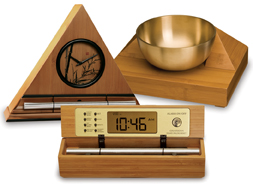 Tibetan Singing-bowl Timer & Chime Mediation Clocks
Posted in Meditation Timers, Meditation Tools, Natural Awakening, Now & Zen Alarm Clocks, Zen Gardens, Zen Timepiece by Now & Zen, Zen Timers
 winter self massage During winter, nature sighs deeply and burrows down for a long sleep. Like the denning bears and squirrels, use these cozy times to reduce stress. Especially in urban environments, we often become detached from this seasonal message. Continuing at a frenzied pace, we develop anxiety, high blood pressure, and digestive upset. To reduce stress, “in winter we focus a lot more on massage and nutrition,” says hydrotherapist Kristi Zimmer. Try this self-massage five minutes before bed and just after waking up in the morning: Set your Zen Chime Timer for 5 minutes. Lie on your back and make gentle circular motions around your belly with both hands, going clockwise as you breathe deeply. After five minutes of this, leave your hands on your stomach as you take 20 deep breaths, sending the breath to your organs. The deep breathing calms the body and mind, while the massage aids digestion.
adapted from Natural Solutions Magazine, January 2007 by Nora Isaacs
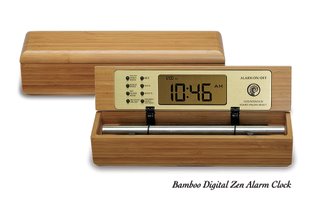 Chime Timers in Bamboo with Natural Acoustic Chimes Now & Zen’s Natural Chime Timer Store
1638 Pearl Street
Boulder, CO 80302
(800) 779-6383
Posted in Bamboo Chime Clocks, Chime Alarm Clocks, intention, Meditation Timers, Meditation Tools, mindfulness practice, Natural Awakening, Well-being, Zen Timers
 Floating Away... Ukiyo-e by Takeuchi Keishà Digital Zen Alarm Clock features
1) Alarm Function, features Now & Zen’s signature 10-minute wake up chime sequence—the perfect amount of time for your progressive awakening. The chime strikes gradually increase according to a golden ratio progression, which you can read about on pages 26-28 of the clock’s booklet, available on Now & Zen’s website.
(2) Countdown timer, perfect for meditation, counts backwards from any set time. It can be set from a minimum of 10 seconds to a maximum of 20 hours. When the timer reaches zero it strikes the chime once, and then begins its preprogrammed progression of chime strikes—striking again in 3 minutes, then in one minute—the same progression as the alarm sequence. We usually set ours for 20 minutes, but then linger in meditation for the first few chime strikes once the strike sequence begins.
(3) Interval timer, is perfect for yoga or other practices wherein a periodic reminder can help guide you through the practice. The interval timer uses the same function as the countdown timer except when it counts down to zero, it strikes only once and then begins counting down again from the pre-set time, continuously. We set the interval timer to strike every minute during yoga sessions to signal the time to change positions.
(4) Hour Chime, is a wonderful feature with many uses. The clock can be set to simply chime once on the hour every hour (muted automatically when the alarm is set, so you can sleep). We use this feature in our office to help the day go by, and when it rings on the hour it helps end meetings on time with a crisp “ding”.
 Digital Zen Alarm Clocks, available in maple, walnut, bamboo, and black lacquer
(5) The Chime’s tone, the Digital Zen Clock comes in either a 7 inch “B Tone” or a 9 inch “E Tone” chime. These long-resonating acoustic chimes have been hand tuned using the natural Pythagorean tuning method to produce the same frequencies as the tuning forks used by musical therapists. The chime strike force can be set to “Low” or “High” to create a tone optimal for you.
(6) Power and light, the clock runs on AC power (plug included) or on 2 AA batteries (not included). The LCD display is lighted. When in battery mode the light comes on by touching any button and goes off automatically in 10 seconds to save power. When the clock is plugged in it can be set so that the display light stays on permanently.
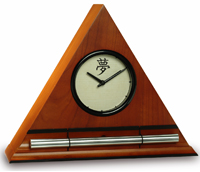 Chime Alarm Clock - Soft Sounds Alarm Clocks Now & Zen’s Acoustic Alarm Clock Shop
1638 Pearl Street
Boulder, CO 80302
(800) 779-6383
Posted in Chime Alarm Clocks, Golden Ratio, Japanese Inspired Zen Clocks, Meditation Timers, Meditation Tools, Natural Awakening, Now & Zen Alarm Clocks, Progressive Awakening, Yoga Timer, Yoga Timers by Now & Zen, Zen Timers
 Japanese Ukiyo-e Crane Print, unknown Now & Zen, Inc. – Boulder, CO – they integrate “real” Natural Sounds into The Zen Alarm Clocks
The natural foods industry is evolving to encompass the broader category of “natural products.” And The Zen Alarm Clock is perhaps the first truly “natural” electronic consumer product: it features an acoustic Tibetan bell-like chime producing natural sounds (as opposed to a sound produced by a speaker); it is housed in a natural hardwood case; and the gradually increasing 10 minute progression of the chime strikes simulates the process of waking up naturally. The Zen Alarm Clock thus appeals to the natural product consumer on many levels — even the aesthetic of its design was created with these people in mind.
 Bamboo Zen Alarm Clock, a natural consumer electronic product Now & Zen – The Gradual Alarm Clock Store
1638 Pearl Street
Boulder, CO 80302
Posted in Chime Alarm Clocks, Japanese Inspired Zen Clocks, Natural Awakening, Now & Zen Alarm Clocks, Progressive Awakening
 Snow print by Suzuki Harunobu It’s snowing heavily, and everyone in the backyard is in a swimsuit, at some kind of party: Mom, Dad, the high school principal, there’s even an ex-girlfriend. And is that Elvis, over by the piñata?
Uh-oh.
Dreams are so rich and have such an authentic feeling that scientists have long assumed they must have a crucial psychological purpose. To Freud, when dreaming provided a playground for the unconscious mind; to Jung, it was a stage where the psyche’s archetypes acted out primal themes. Newer theories hold that dreams help the brain to consolidate emotional memories or to work though current problems, like divorce and work frustrations.
Yet what if when dreaming isn’t psychological at all?
In a paper published last month in the journal Nature Reviews Neuroscience, Dr. J. Allan Hobson, a psychiatrist and longtime sleep researcher at Harvard, argues that the main function of rapid-eye-movement sleep, or REM, when dreaming occurs, is physiological. The brain is warming its circuits, anticipating the sights and sounds and emotions of waking.
“It helps explain a lot of things, like why people forget so many dreams,” Dr. Hobson said in an interview. “It’s like jogging; the body doesn’t remember every step, but it knows it has exercised. It has been tuned up. It’s the same idea here: dreams are tuning the mind for conscious awareness.”
Drawing on work of his own and others, Dr. Hobson argues that when dreaming is a parallel state of consciousness that is continually running but normally suppressed during waking. The idea is a prominent example of how neuroscience is altering assumptions about everyday (or every-night) brain functions.
adapted from The New York Times, November 2009 by Benedict Carey
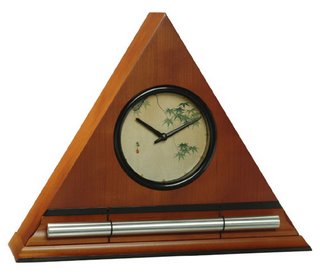 Honey Japanese Maple Leaves Zen Alarm Clock, calming alarm clock useful for remembering one's dreams Now & Zen
1638 Pearl Street
Boulder, CO 80302
Posted in Chime Alarm Clocks, Japanese Inspired Zen Clocks, Natural Awakening, Now & Zen Alarm Clocks, Progressive Awakening, Sleep Habits, Ukiyo-e, Zen Clocks and Dream Recall
« Previous Page — « Previous Entries
Next Entries » — Next Page »
|
|
|
|